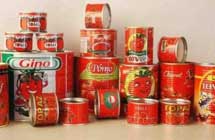含高剂量氧化锌?罐装食品或伤害消化系统
The next time you opt for canned foods such as corn, tuna, asparagus or chicken, think twice. They may contain zinc oxide that can potentially damage your digestive system, warn researchers.
下次你选择吃罐装食品,比如玉米罐头、金枪鱼罐头、芦笋罐头或者鸡肉罐头之前,要三思而行。研究人员提醒说,这些罐装食品中含有的氧化锌可能会损害你的消化系统。
The findings showed that nanoparticles of zinc oxide present in the lining of certain canned goods, usually considered good for its antimicrobial properties and preventing staining of sulfur-producing foods, may negatively affect the way in which human digestive tract operates.
研究显示,某些罐装食品包装内层含有的氧化锌纳米微粒对人类消化道的运转有坏处。人们通常认为这些氧化锌纳米微粒具有抗菌特性,可以防止产硫食品的污染。
"We found that zinc oxide (ZnO) nanoparticles at doses that are relevant to what you might normally eat in a meal or a day can change the way that your intestine absorbs nutrients or your intestinal cell gene and protein expression," said Gretchen Mahler, Associate Professor at the Binghamton University in the New York.
纽约宾汉姆顿大学副教授格蕾琴•马勒说:“我们发现氧化锌纳米微粒的剂量与你在一顿饭或一天中通常吃的东西有关,它会改变肠道吸收营养素的方式,以及你的肠细胞基因和蛋白质表达。”

Researchers found that canned food contained 100 times the daily dietary allowance of zinc.
研究人员发现,罐装食品的锌含量是平均每天应摄入量的100倍。
"They tend to settle onto the cells representing the gastrointestinal tract and cause remodelling or loss of the microvilli, which are tiny projections on the surface of the intestinal absorptive cells that help to increase the surface area available for absorption," Mahler added.
马勒补充说:“氧化锌纳米微粒容易聚集在胃肠道细胞上,改变小肠吸收细胞表面微绒毛的结构甚至减少微绒毛数量,这些微绒毛能增加肠道可吸收表面的面积。”
This loss of surface area tends to result in a decrease in nutrient absorption.
肠道可吸收表面面积的减少会减弱营养吸收功能。
Some of the nanoparticles also cause pro-inflammatory signaling at high doses, and this can increase the permeability of the intestinal model, the researcher said.
马勒说,一些氧化锌纳米微粒在高剂量下还可能触发促炎信号,从而增加肠道模型的渗透率。
In other words, it can even allow the passage of compounds that are not supposed to pass through into the bloodstream.
也就是说,这会允许原本不该通过的化合物进入血液。
The study, published in the journal Food & Function, looked at how many particles might be transferred into the canned food.
这项研究报告发表在《食品与功能》期刊上,论述了罐装食品中会渗入多少氧化锌纳米微粒。
"Our model shows that the nanoparticles do have effects on our body in vitro model, and that understanding how they affect gut function is an important area of study for consumer safety," Mahler said.
马勒说:“我们的体外模型显示,(氧化锌)纳米微粒对人体确有影响,理解它们如何影响肠道功能对消费者安全具有重要意义。”